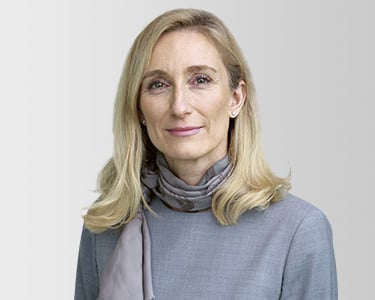In a recent interview with Business Insider, Anette Bronder talks about her tasks, goals, the potential of data and digitalization, and how her career as a handball player still helps her in her job today.
Whoever comes to Zurich’s main station and wants to visit Anette Bronder must walk through the city first. Straight ahead, along Bahnhofstrasse, past the suits, the banks, and the expensive shops with the grumpy bouncers. At the end of the street, a view of Lake Zurich opens, sparkling in the midday sun as it struggles to break through the clouds. On the right side of the lake is the building where Anette Bronder works.
Anette Bronder´s office is on the top floor in a meeting room, where an astonishing view of the lake and the opposite sunny side of the shore appears. In an interview with Business Insider, Anette Bronder talks about her goals, the potential of data, and digitalization, and she reveals how her career as a handball player still helps in her job today.
The Swabian graduated from high school in Stuttgart and studied social sciences and economics there. The IT industry was not her primary goal, she was rather playing with the idea of becoming a journalist. But through personal contacts, she became aware of Hewlett Packard, which was based in nearby Böblingen. She joined HP in 1997, where she stayed for 13 years. Then followed by the telecommunications industry, first at Vodafone, then at Telekom, most recently as managing director in the security division.
Anette Bronder wants to see that the company is running.
What attracted her to the role of Chief Operating Officer (COO) was the wide range of opportunities. On the one hand, there is the very operational activity. “We make sure that the company is running,” says Anette Bronder. On the other hand, there is also the topic of innovation since technology and IT topics are in her area. And thirdly, there is the topic of efficiency. In summary: “We not only keep the business running but also ensure the efficiency and competitiveness of the company.”
She also has a North Star. “Our big agenda is digital transformation,” says Bronder.
Put simply, the business of reinsurance is to underwrite insurance. “We come from a world where reinsurance was very much supported by data. In the future, our business will be led by data,” says Anette Bronder. “Our big agenda is digital transformation,” says Bronder. There are traditional companies in this industry that date back to the 19th century. A few years ago, they still worked relatively much with paper contracts. The challenge of initiating digital changes is correspondingly great.
Anette Bronder tells us, that “nothing in the world replaces people.”
According to Anette Bronder, digital transformation has several facets. The most important: “Nothing in the world replaces people”. Rather, it is about empowering employees and customers to deal with technology. The infrastructure is important. “The consistent path to the cloud is crucial here,” says Anette Bronder. Multi cloud providers like ConsoleConnect and others are options to connect to clouds. Also, technological partnerships with the big players and software providers worldwide are needed. “Nobody does digitization alone,” says Anette Bronder.
The most important achievement, according to Bronder, is that everything is digitalized today, especially paper contracts. “Nothing is in individual files anymore, access is completely digitized, which means all data is in one place.” Anette Bronder calls this “data democracy”. Anyone who is authorized could access the most important software and data tools from their workstation. “Nothing is in the head of just one person anymore. The company makes its knowledge available to everyone,” says Bronder.
According to Anette Bronder: ”We can have a great impact“
In Summer 2020, there was a big explosion in the harbor of Beirut. Because of modern digital analysis, the economic damage could be estimated just a few hours after the disaster. The advantage of digitalization is the access to direct data, which leads to greater speed and suitability. “We know the important risk exposures. Where for example dangerous goods are stored, where ships are or the distribution of value in real estate”, says Anette Bronder. Another advantage of Data is the calculability of the future. “We can make a contribution by preventing damages with foresight.”
The changes are not only technological but also about cooperation. “I think successful cooperation’s do not define themselves over organizational structures. But rather about adding value.”
The trend is towards interdisciplinarity. Of course, excellence in the core business must be maintained, but it is also about creating room for innovation and giving employees enough freedom. Recently a project was launched, the so-called “Living Lab”, in which classic workplaces were reduced and instead investments were made in collaboration and project zones to promote more exchange and encounters as well as hybrid collaboration.
“People need contacts, inspiration, and energy”
You might think that Anette Bronder, as a digitalization expert, would be an advocate of video conferencing and home offices, but that is not the case. “Of course, we can do business online, but when it comes to new topics, innovation and transformation, there is no substitute for personal contact,” she says. “People need contacts, inspiration, and energy. You can’t feel an atmosphere virtually”
Anette Bronder draws a parallel to her career as a handball player when she was younger. When she played with VfR Sindelfingen in the regional league, Anette Bronder said: “I’m a team player and I like working with people in strong teams.” Handball also taught her to work towards a point to focus and to have goals. As a goalkeeper, Anette Bronder played in a position that requires courage. After all, balls fly around your ears from a short distance. Bronder says it makes her deal with challenges and risks differently. “As a goalkeeper, I take a step out when others retreat. But I don’t stand in the goal blindly. I know what I am doing.”
